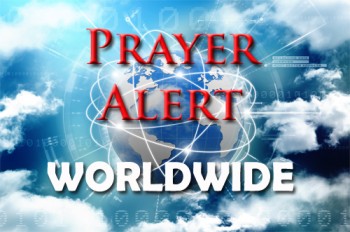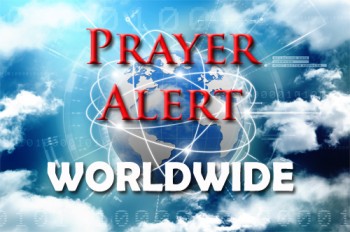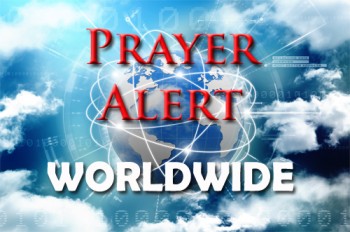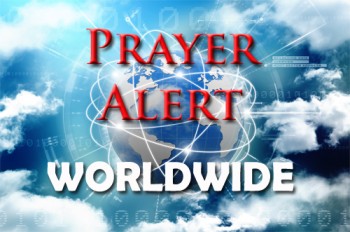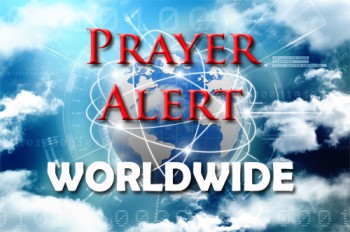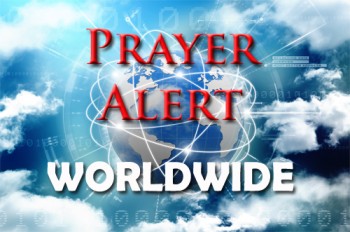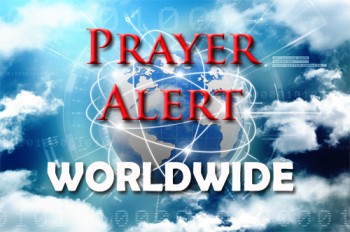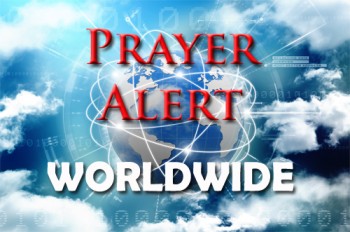Displaying items by tag: Africa
Mali: 130 villagers murdered
Dogon gunmen recently surrounded a community of Fulani herders in Mali and murdered over 130 men, women, and children with guns and machetes. The village was left in smouldering ruins. Ethnic and jihadist violence has spun out of control. In fact, UN ambassadors were in Mali to discuss the crisis when the massacre took place. Since a 2015 peace agreement, ethnic groups have continued to resort to violence to settle their differences. Islamic militants take advantage of the chaos, securing safe havens and new recruits. Hundreds of lives have been lost as the violence has escalated. Dogon hunters and semi-nomadic Fulani herders fight over access to land and water. The Dogon also accuse Fulanis of ties to jihadist groups. The Fulanis say Mali's military arms the hunters to attack them. Less than 10% of citizens have heard of Jesus. However no nation is a lost cause. See
Algeria: door open for Al-Qaeda to grab power
With President Abdelaziz Bouteflika quitting, Al Qaeda terrorists could now fill the political vacuum. Bouteflika held office for 20 years, then the military told him to go following continuing street protests. In March, leading Al-Qaeda official Abu Ubaydah Yusuf al-Anabi urged Muslims to unite to ensure Algeria is ruled by sharia law. Al-Anabi, designated a ‘terrorist’ by the US state department, called on citizens to reject any regional or tribal identities and unite as ‘sons of Islam’ to create an Islamic emirate. The speaker of the upper house of parliament has become the country’s 90-day caretaker president until elections are held. But one protest leader said that the street demonstrations will continue because ‘we do not accept the caretaker government’. Young Algerians are demanding jobs in a country where one in every four under the age of 30 is unemployed, in an economy dependent on oil and gas exports.
Sudan’s president steps down
‘The regime has fallen, we won!’ was the cry outside the defence ministry as the three-decade reign of President al-Bashir came to an end on 11 April. President Omar al-Bashir has stepped down, and consultations are under way to set up a transitional military council to run Sudan. Bashir is under heavy guard at the presidential residence. Tens of thousands of Sudanese took to the streets in the centre of Khartoum in jubilation, dancing and chanting anti-Bashir slogans. Since 19 December 2018, Sudan has experienced persistent violent demonstrations sparked by the government’s attempt to raise the price of bread, and an economic crisis that has led to fuel and cash shortages.
Libya: continuing crisis
Libya has been beset by chaos since Gaddafi’s overthrow in 2011. During the uprising, anyone with a gun commanded respect. An estimated 1,700 armed groups emerged. Only these armed militias really wield power: it is felt that they often hold to ransom the politicians they supposedly back. Also, many are concerned that IS now has a presence there. On 4 April warlord Khalifa Haftar began an attack on Tripoli to wrest it from the UN-backed prime minister. So far at least 56 people have been killed and 266 wounded, according to the WHO. It said it had sent emergency teams to assist frontline hospitals; thousands of people had fled their homes. UN secretary general Antonio Guterres has called for a ceasefire to avoid what he described as a dramatic, bloody battle. Europe is split over how to respond: see
Chinese hear gospel while working in Africa
Due to the influx of roughly 10,000 Chinese-owned companies into Africa, up to one million Chinese are hearing the gospel from African Christians and bringing their newfound religion home. While new religion regulations are in place in China to ‘block extremism’, African churches are reaching out to Chinese workers by incorporating Mandarin into services; the Chinese have welcomed the sense of community and belonging that Christian churches offer. Also, missionaries from Taiwan are targeting Chinese nationals in Africa, preaching with a freedom they would never be allowed in the People's Republic. When evangelised Chinese Christians return home, they bring their new faith with them. There are an estimated 93 to 115 million Protestants currently in China. If current growth rates continue, the nation will soon have more Christians than any other country in the world.
Mozambique: pray for renewal
Before Cyclone Idai devastated 1.7 million lives, Mozambique was known as the ‘Land of Smiles’. Now there is no electricity, no running water, homelessness, cholera and many still awaiting aid. But the greatest tragedy is that many of these souls were unprepared to face eternity that day. In fact, many in Mozambique have yet to even be reached with the Gospel of Jesus. In recent years spiritual responsiveness has increased, and many are turning to Jesus. But the urgency remains. Rampant disease, natural disasters, and widespread poverty were there before Idai. The time for people to hear about Jesus is now. Pray for true freedom for those in bondage to poverty, disease, witchcraft, and animism. Pray for the Church in Mozambique and neighbouring nations, for its leaders to grow in spiritual maturity and Biblical understanding. It is believed that 40% of the world’s unmined rubies are in this poverty-stricken country. Pray for honest investment into underdeveloped resources to strengthen the fragile economy.
Nigeria: abducted for her gender, enslaved for her faith
Esther refused to deny her faith when she was abducted by Boko Haram as a teenager. She was forced to marry one of the militants and faced horrific abuse at his hands. Soon she became pregnant. When she finally escaped and returned to her village, her community mocked her for being a ‘Boko Haram woman’. Even her own relatives called her daughter ‘Boko’, not Rebecca. There are thousands of women like Esther, who are doubly at risk of persecution, both because of their gender and because of their faith in Jesus. We, the global church, cannot allow the persecution facing our sisters to go unseen and ignored. We can pray for an increase in resources to be available for those who are giving them support and hope for the future God has prepared for them.
God rescues 72 from firing squad
In Nigeria, Boko Haram captured 76 Muslim-background Christians. Four men were told at gunpoint to renounce Christ and revert to Islam. When they refused, they were shot in front of their families. Later the men’s wives were ordered to renounce Christ, or their children would be executed the next day. In the morning the children ran in, saying Jesus told them in the night that ‘all would be well’. Then Jesus appeared to them all and told them He would protect them. When the mothers again refused to renounce Christianity their children were lined up against a wall. As the soldiers took aim they suddenly grabbed their heads, screaming ‘Snakes!’ Some ran away, others dropped dead. A captive grabbed a gun and was about to fire at the fleeing militants but a child put her hand on his arm and said, ‘You don’t need to do that. Can’t you see the men in white fighting for us?’
Chad: open doors to Christian mission
Largely semi-desert, Chad is one of the poorest and least-developed countries in the world with 150 different ethnic groups. Most have not heard of Jesus. Drought, civil conflict, distance from the sea and poor infrastructure cause health and social problems. Life expectancy averages 47 years and infant mortality remains high. The nation is plagued by waterborne diseases such as malaria and meningitis. Pray for Mission Africa, the Evangelical Church of Chad, and Korean NGOs, who responded to these needs in the areas of evangelism and medical care. Pray also for Mission Chad who care for 83 orphans, teach 470 students, and help people to cultivate farm land for future harvests. Also, the Global Alliance of Church Missionaries works with young churches running Christian radio stations for the 120 languages spoken among communities who have never heard the gospel. See https://team.org/regions/africa/chad
Cyclone Idai: race against time
According to the UN, Idai could be the southern hemisphere’s worst-ever disaster. Over 2.6 million people have been affected. Pray for all those coping with stress, grief and loss. Zimbabwe was already in a food crisis; now most crops are washed away. There will be no harvest. Pray for adequate food aid. There is a desperate need for clean drinking water, especially in the ‘difficult to reach’ areas. Cholera has been reported in Beira, still struggling to provide clean water and sanitation. WHO is dispatching 900,000 doses of oral cholera vaccine to affected areas later this week. Pray that these supplies would be enough to halt the spread. Pray also for effective distribution of rehydration salts and adequate intravenous drips. Other waterborne diseases like typhoid and malaria also pose a risk. Pray for adequate healthcare to prevent all types of disease spreading.
